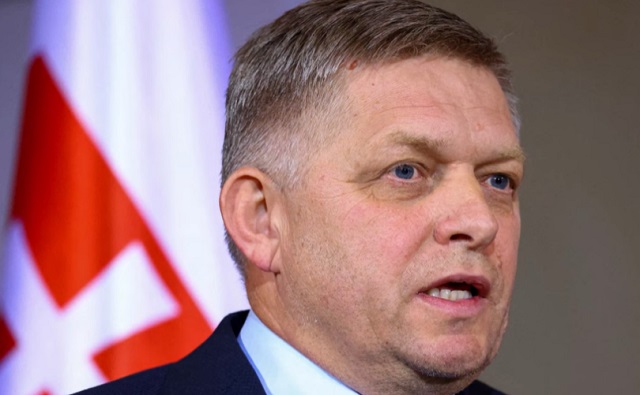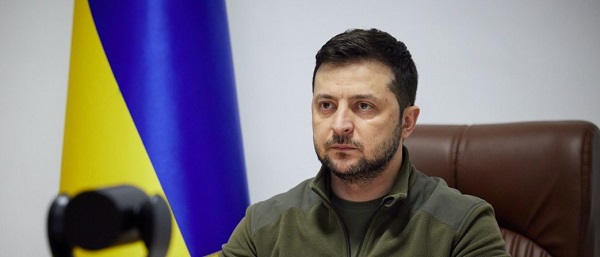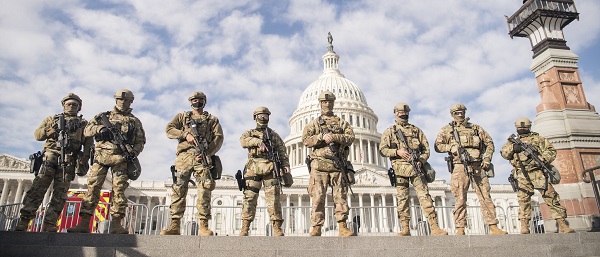International
Is the attempted assassination of anti-globalist Slovakian prime minister a warning of things to come?

Slovakian Prime Minister Robert Fico
From LifeSiteNews
By Angeline Tan
On April 10 of this year, Fico ominously predicted that assassination attempts like the one on his life could very well happen in his country:
And I’m just waiting for this frustration, intensified by Dennik N, SME or Aktuality (Slovak news), to turn into the murder of some of the leading government politicians.
On May 15, Slovakian Prime Minister Robert Fico was shot in what the country’s Interior Minister Matúš Šutaj Eštok described as a “politically motivated” assassination attempt, according to reports from Euractiv.
Based on eyewitnesses cited by Euractiv, Fico was greeting people at the House of Culture in the Slovak city of Handlová when he was shot.
Eštok cautioned that Slovakia was “on the edge of a civil war” owing to political disagreements with the Fico government, also declaring that Juraj Cintula, the 71-year-old man who fired five bullets at Fico, may have “acted as part of a group of people that had been encouraging each other to carry out an assassination,” as per Reuters reports.
According to local reports, just two hours after Cintula’s attempted killing of Fico, the suspect’s “communication history” online was deleted.
While Slovak authorities found that Cintula had no prior criminal record, he had been outspokein in his opposition to Fico’s government. Materials uploaded on social media depicted Cintula participating in an anti-Fico protest, chanting, “Long live Ukraine!”
Based on reports by Slovak media, Cintula told police that he had planned the attack a few days prior, but that he did not plan on killing Fico.
The CNN news outlet quoted Eštok as saying:
The reasons (the suspect gave) were the decision to abolish the special prosecutor’s office, the decision to stop supplying military assistance to Ukraine, the reform of the public service broadcaster and the dismissal of the judicial council head.
Interestingly, the reactions of mainstream media outlets to Fico’s attack belie their bias against the bullet-ridden Slovak leader, whose Smer-Social Democracy Party won last year’s elections on a campaign that resisted mass migration, guarded national sovereignty against centralized European Union control, and lambasted NATO’s military aid to Ukraine.
For instance, the BBC news outlet had this to say:
Fico has been accused of cosying up to figures like Hungarian Prime Minister Viktor Orbán, which has led some analysts to speculate that he might be trying to steal a page from the regime of a leader described by the European Parliament as running a ‘hybrid regime of electoral autocracy.’
Likewise, the U.K.’s Daily Mail portrayed Fico as a “pro-Putin” “anti-vaxxer”:
Critics argue that he has abandoned Slovakia’s pro-Western course..he is fiercely opposed to immigration and has criticized same-sex marriages. He became the country’s most prominent voice against masks, lockdowns and vaccinations during the Covid pandemic. He is also an admirer of Vladimir Putin and has vowed not to support Ukraine.
Furthermore, Sky News claimed that “Fico has long been a divisive figure,” characterizing the Slovak leader as “pro-Russian, anti-American.” Responding to mainstream media outlets’ “palpable coldness” to Fico’s shooting, particularly that of Sky News, Brendan O’Neill wrote in The Spectator:
A guest commentator said Fico’s views are ‘very divisive in Slovakia’ and ‘very divisive in the EU’. And therefore – wait for it – ‘it’s not surprising that this sort of event might take place’. Got that? Because Fico is a controversial figure, according to the EU anyway, it shouldn’t be a great shock that someone decided to shoot him. It is hands down the most disturbing thing I’ve heard on a mainstream news channel in some time. A democratically elected leader is riddled with bullets, Slovakian democracy itself is horrifically assaulted, and you’re not surprised?
O’Neill added:
The commentator on Sky listed Fico’s supposedly problematic views. He’s a populist and a nationalist, we were informed. Worse, he opposes military aid for Ukraine. What are we saying here? That it is ‘not surprising’ if public figures who hold such views – that nationhood is important, that the EU can be a pain in the backside, that aid to Ukraine should stop – are set upon by maniacs? This strikes me as a very dangerous message.
Fico’s supporters have blamed the onslaught of media villainization of the leader as one of the causes that prompted Cintula to shoot him. Eštok also decried the unfavorable media coverage of Fico:
It was information that you have recently presented. The way you presented them, I think each of you can reflect.
As Conor Gallagher wrote in Naked Capitalism:
… it’s the questioning of the NATO line and opposition to digging the Project Ukraine hole even deeper that got Fico and Smer in hot water with the Atlanticists that run Europe nowadays. Fico and Smer are relentlessly labeled pro-Russia for nothing more than their belief that Project Ukraine is not good for Slovakia. Not that there’s anything wrong with being pro-Russia, but since when does not wanting to go to war with Russia make one ‘pro-Russia’?
In comments about mainstream media portrayals of the Eurosceptic Fico as “pro-Russian,” Sputnik columnist Dmitry Babich said:
Such clichés became commonplace in mainstream European press against any non-systemic political leader who stands for his or her country’s sovereignty or veers from the EU’s ‘common foreign policy,’ not necessarily in unison with Russia.
On the same note, senior research fellow at the Global Policy Institute George Szamuely remarked:
[The alleged shooter is] basically on the same side as all of the EU media, the EU apparat, all the EU political figures who have been denouncing Fico and Slovakia for their supposed pro-Putin, for his supposed pro-Putin agenda, for his being in the service of the Kremlin. {The media has] come up with another story, which is that, somehow, Fico brought this on himself… because he’s such a polarizing figure. He’s so divisive and the political atmosphere in Slovakia is very, very toxic. A lot of hatred, a lot of hate speech. And, who’s behind it all? Robert Fico.
“There is social polarization and political antagonism in all of Europe, but usually nobody is shooting at prime ministers. [This happened] only in Slovakia,” Dimitris Konstantakopoulos, a former security and foreign policy advisor to late former Greek Prime Minister Andreas Papandreou, declared in statements to Sputnik, commenting on the dangerous situation which has developed in the heart of Europe in the wake of the attempt on Fico’s life.
“What people will think all around Europe is that this is a signal to any politician who would like to disagree with the main NATO and the European Union policies – that he has to be careful not to be assassinated,” Konstantakopoulos elaborated.
“I will remind you that they have already blown up the Nord Stream pipeline, and we’ve also had the assassination or attempted assassination of Russian journalists and politicians inside Russia. So it seems that [going back] long ago there was a ‘war party’ in the West which has decided not to permit a Russian victory in Ukraine. And that means using all possible means,” Konstantakopoulos highlighted.
Pro-Ukraine forces hoping to “discipline” leaders who do not support Ukraine in its conflict against Russia can use violence or other ways to push their agenda forward, Konstantakopoulos told Sputnik.
In context, Brussels has previously threatened to undermine the economy of Viktor Orbán’s Hungary if he vetoes Ukraine’s attempt to become an EU member. Also, in May this year, the Verden regional court in Lower Saxony, Germany, ruled that the Rotenburg Eurosceptic Alternative für Deutschland (AfD) leader Marie-Thérèse Kaiser was guilty of “incitement to hatred” for posting crime statistics showing that Afghanistan refugees committed a disproportionate number of sex offenses in the country.
The German court’s ruling caught the attention of billionaire Elon Musk, with Musk posting:
Are you saying the fine was for repeating accurate government statistics? Was there anything inaccurate in what she said?
Last year, AfD co-leader Tino Chrupalla was reportedly attacked with a syringe, causing him to go into anaphylactic shock, during an election campaign event in Ingolstadt, Bavaria. Nevertheless, the Associated Press (AP), citing German prosecutors and police, stated that “there were no indications yet that Chrupalla was attacked.”
Days earlier, Alice Weidel, another AfD co-leader, along with her family, had been scurried away to an undisclosed location for safety following intelligence reports of an upcoming attack on the nationalist politician. Rather than keeping silent or denouncing violence, leftist German Green Party MP Renate Künast, in an X post, questioned if Weidel had staged the “security problem to suit the election” in Bavaria at that time.
On April 10 of this year, Fico ominously predicted that assassination attempts like the one on his life could very well happen in his country:
And I’m just waiting for this frustration, intensified by Dennik N, SME or Aktuality (Slovak news), to turn into the murder of some of the leading government politicians.
Fico’s ominous predictions are not entirely unfounded, given the history of covert operations (that were sometimes violent) in Europe.
Following Fico’s shooting, India-based news outlet Firstpost ran an article citing U.S. journalist Nebojsa Malic and Habertürk reporter Ozcan Tikit stating that a continuation of “Operation Gladio” was linked to the attempt on Fico’s life.
The same article described Operation Gladio as “a clandestine operation involving a network of ‘stay-behind’ armies established in Europe during the Cold War,” backed “by NATO and the CIA with the cooperation of European intelligence agencies,” to gear up for a possible invasion by the then-Soviet Union.
Notably, the article reported that “NATO played a central role in coordinating these secret armies aiming to ensure that resistance would continue even if the official military forces were defeated or occupied,” ensuring “violent incidents including bombings and assassinations to destabilize the political situation.”
Firstpost added:
While initially intended as a defensive measure against a Soviet invasion, some of these groups became involved in internal political activities including influencing elections, engaging in acts of terrorism and manipulating political processes to counteract left-wing movements and parties.
Strikingly, while Fico has been labeled as “pro-Russia” by many mainstream media outlets, these same media outlets were quick to point out his attacker’s apparent links to pro-Russia paramilitaries and anti-immigrant forces, rather than highlight the attacker’s sympathies for the Kyiv regime under anti-Christian leader Volodymyr Zelensky. Ironically, Sky News reported the fact that Cintula, the would-be assassin, had commemorated the birthday of Marxist terrorist Che Guevara, a key figure in the Cuban revolution.
Evidently, the EU globalists, as echoed by their sycophants in establishment media outlets, have revealed their true colors once again via their reactions to Fico’s shooting. In view of the impending European Parliament elections from June 6 to 9, during which conservative and Eurosceptic politicians are set to win many votes, it is very likely that the globalist brahmins in Brussels and their coterie are panicking to retain power, even as their legitimacy to lead is declining.
In desperation, it would not be surprising if more assassinations (both physical and character) aimed at dissident leaders or public figures take place in the future.
Daily Caller
Zelenskyy Under Siege As Top Aide Resigns After Home Raided In Major Corruption Scandal


From the Daily Caller News Foundation
Ukrainian President Volodymyr Zelenskyy’s chief of staff, Andriy Yermak, resigned Friday after his home was raided in an ongoing corruption probe that threatens to undermine Zelenskyy’s grip on power during wartime.
Ukrainian authorities on Friday raided the home of Andriy Yermak, Zelenskyy’s chief of staff and right-hand man, as part of a sweeping corruption probe investigating Zelenskyy’s possible involvement in a $100 million scheme to defraud the nation’s atomic energy company. Yermak’s resignation comes at a time when Zelenskyy is under increasing pressure to accept a U.S.-brokered peace deal to end Ukraine’s war with Russia.
The investigation has shaken Ukrainian confidence in Zelenskyy’s administration while Russian strikes continue to rock critical infrastructure. So far, Russia has not commented on the new proposed peace deal.
As a nonprofit, we are dependent on the generosity of our readers.
Please consider making a small donation of any amount here.
Thank you!
Zelenskyy first rose to power on an anti-corruption platform in the 2019 elections, which propelled him into the international spotlight. He has enjoyed a positive global reputation during the three-year war with Russia and has been hailed by numerous Western leaders as a beacon of democracy against autocratic Russia.
Zelenskyy has so far worked with the U.S. on the proposed peace agreement, but has also expressed major reservations about what it will mean for his country. In a public address on November 21, Zelenskyy said the plan puts Ukraine in the position of “either losing its dignity or the risk of losing a key partner.”
Despite the prospect of losing U.S. intelligence sharing and weapons if Ukraine doesn’t accept the deal, Zelenskyy has been shoring up European alliances and international support, most recently signing a deal with France to obtain 100 Rafale jets for its air force. The deal also included anti-air equipment, drones and other munitions.
The Ukrainian Ministry of Foreign Affairs did not immediately respond to the Daily Caller News Foundation’s request for comment.
International
Identities of wounded Guardsmen, each newly sworn in

The two West Virginia National Guard members critically wounded in Wednesday’s ambush near the Farragut West Metro Station have now been identified as Andrew Wolfe and Sarah Beckstrom — young soldiers who had taken their oaths less than a day before gunfire erupted on a downtown Washington sidewalk.
Wolfe, 22, was identified first after Musselman High School in Inwood released a statement confirming the alumnus was one of the soldiers struck. The school said the community was “deeply saddened” and urged residents to pray for him. Wolfe was rushed into surgery and remains in critical condition.
Support poured in across the Eastern Panhandle throughout the day. Friends shared old photos and messages urging him to “keep fighting.” Wolfe, who lives in Martinsburg, is active in the region’s cornhole community, and the Beltway Baggers — organizers of ACL tournaments in Virginia — posted a photo of him flashing a peace sign while asking members to pray for his recovery. “He was shot today while serving our country,” the group wrote.
Federal officials identified the second Guardsman on Thursday as 20-year-old Sarah Beckstrom. U.S. Attorney Jeanine Pirro said Beckstrom had just taken her oath of enlistment and was barely a day into her service when she was gunned down. She underwent emergency surgery and remains in critical condition.
According to investigators, 29-year-old Rahmanullah Lakanwal — an Afghan national admitted to the U.S. following the Kabul evacuation — allegedly stepped from behind a corner and opened fire at close range as the two patrolled under a heightened security directive in the capital. Beckstrom was hit first. Wolfe was shot moments later.
Pirro said both families are at the hospital as doctors fight to keep the soldiers alive. She warned that if either succumbs to their injuries, prosecutors will pursue a first-degree murder charge. “If one of them is to pass — and God forbid that happens — this becomes murder one. That’s it.”
Pirro urged Americans to pray for the wounded Guardsmen. “On a day when families gather together, I ask you to pray for these two young people — that they survive.”
-

 Alberta11 hours ago
Alberta11 hours agoFrom Underdog to Top Broodmare
-

 armed forces2 days ago
armed forces2 days ago2025 Federal Budget: Veterans Are Bleeding for This Budget
-

 Alberta1 day ago
Alberta1 day agoAlberta and Ottawa ink landmark energy agreement
-

 Artificial Intelligence2 days ago
Artificial Intelligence2 days agoTrump’s New AI Focused ‘Manhattan Project’ Adds Pressure To Grid
-

 International2 days ago
International2 days agoAfghan Ex–CIA Partner Accused in D.C. National Guard Ambush
-

 Carbon Tax1 day ago
Carbon Tax1 day agoCanadian energy policies undermine a century of North American integration
-

 International1 day ago
International1 day agoIdentities of wounded Guardsmen, each newly sworn in
-

 International2 days ago
International2 days agoTrump Admin Pulls Plug On Afghan Immigration Following National Guard Shooting





